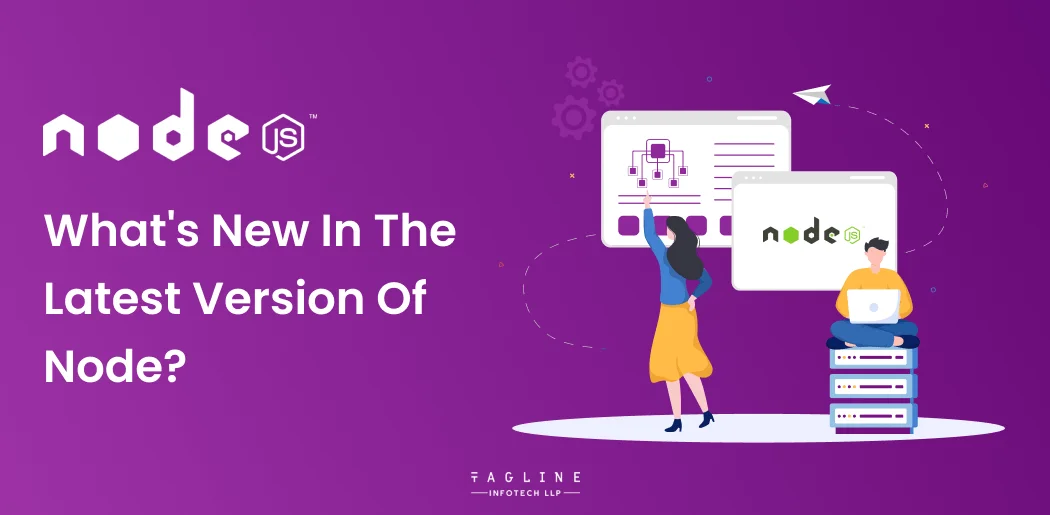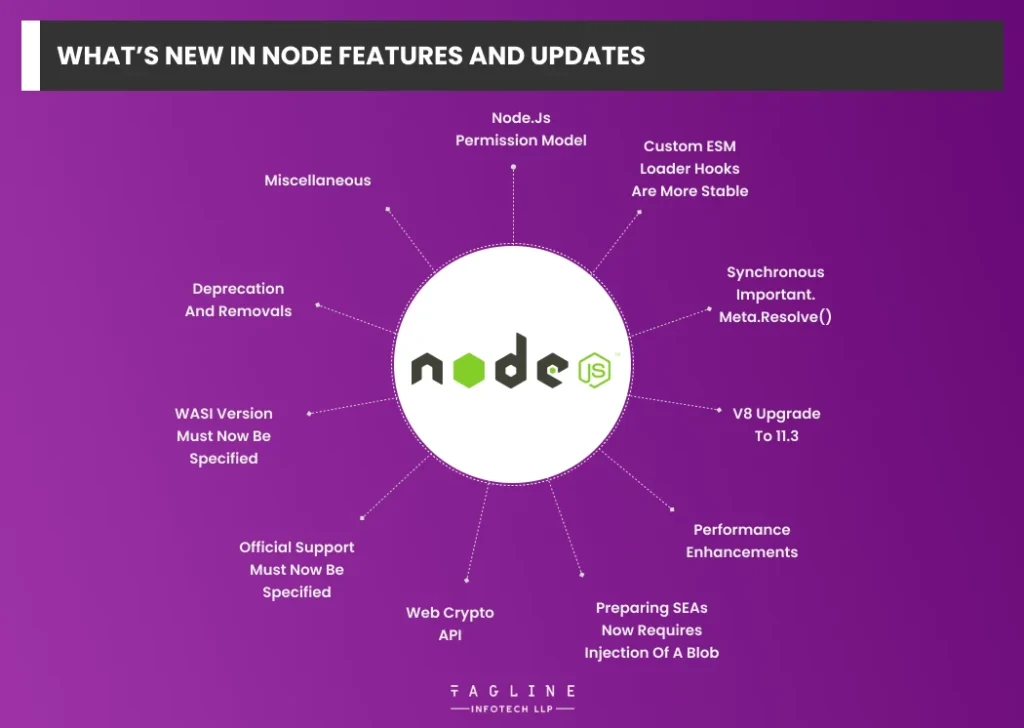Finance & IT Email Marketing: A Data-Driven Approach
February 2, 2026
Home >> Node.JS >> Node 20: What’s new in the latest version of Node?

The Node.js community and team are known for breaking barriers globally for their recent updates and features and following their conventional trend of success for Node 19.
Also, the Node latest version is returning with Node.js 20. Our blog post will cover the newest Node 20 updates and features. Additionally, we have compiled the information about the changes introduced by the latest Node 20 version for business owners and the developer community.
Due to its unique features, the Node.js community do not need any introduction. If you are using the older version of Node.js, it will be best to update it to upgrade your experience. You can also install the recent Node.js for your Mac and Windows by following simple steps. The latest version of Node is available in the market; you can use the updated version in your system.

The Node 20 latest version is launched with many features and upgrades compared to the previous versions regarding error handling, performance, etc. Here let’s know about its latest version of Node
Node.js v20 introduces the Permission Model feature developed by Rafael Gonzaga. This experimental mechanism empowers developers to control access to resources like file operations, child process spawning, system functions, and worker thread creation while their programs run.
To utilize this feature, developers must enable the ‘–experimental-permission’ flag, which restricts access to all available permissions.
This capability allows developers to prevent unauthorized access, safeguard sensitive data, and prevent the execution of malicious code within their applications.
Custom hooks provided through loaders (using ‘–experimental-loader=./foo.mjs’) now operate in a dedicated thread, distinct from the main line.
This separation offers loaders a unique scope, ensuring no interference or code-mixing between loaders and the application.
Synchronizing with the browser performance, the “import.meta.resolve “function can be synchronized. The user can define the loader resolve hooks as synchronous or asynchronous functions based on their performance.
Even if many other async resolve hooks are being loaded, the import. Meta. Resolve will be returned synchronously in the code.
Thanks to Michael Zasso’s contribution, Node.js 20 now includes a whole new version of the V8 engine. As part of Chromium 113, the V8 engine has been updated to version 11.3.
Along with new language possibilities, this update offers other performance improvements, such as the following:
The test_runner codes for the Node.js 19 version were experimental, but Colin Ihrig’s contribution to the recent Node.js 2.0 version will make it stable and updated. It will be ready to use in production. Many of its parts require stability, inclusive of code coverage and reporters.
“Why Choose Node.js for your next Web Development Project? “
– Also Read Article
The team of Node.js is known for their fantastic performance with the launching of their new version. The recent implementation of the Node.js team, particularly focusing on the Node 20 versions list, has been aimed at enhancing performance near their major release.
Besides improvements, Node.js 20 has also introduced many refinements in the runtime fundamental parts, including EventTarget, URL and fetch().
The price for initiating will be minimized and provide limited access to the subsystems employing it. The V8 Fast Api calls perform excellently in many APIs like timers and URL.canParse().
On making the contribution for Daniel Lemire and Yagiz Nizpli, the r Node.js v20, the URL parser, now written in C++ and Ada, has undergone substantial enhancements, significantly improving URL parsing performance.
The Node:url is upgraded to enhance url.domainToUnicode and url.domainToASCII functions. Integrating the recent Ada 2.0 version in Node version 20 in all aspects of Node.js usage will bring better performance than its previous upgrade.
In Ada 1.0.4, the need for ICU as a prerequisite in URL hostname parsing has been eliminated.
Single Executable application, or SEAs, has received much support from the Node.js team, and they have continuously worked to improve it since last year. However, the feature can still be seen as experimental.
Also, Node20 is known for creating the SEAs that need blob injection made by Node.js directly from the JSON config instead of injecting the JavaScript file.
One of the best functionalities of Node.js 20 is the validation and coercion of the arguments related to the API functions of web crypto according to the definitions of WebIDL, which is quite similar to the execution of the APIs of web crypto and also fosters interoperability.
Here, the primary concern is stress on interoperability and many other JavaScript environments.
Looking for a Node.js expert who understands your business and projects requirements?
Our talented developers are ready to craft your business and projects according to your unique requirements
The contributions of Stefan Stojanovic have led to the improvement of the ARM64 Windows support level to tier 2. This has led to the inclusion of ARM64 Windows binaries in the packaging of Node v20, allowing for native execution on the platform.
Like the download pages for other media, the Node.js site will enable visitors to download executable, zip/7z, and MSI files. Furthermore, a change to the CI system has allowed comprehensive testing on ARM64 Windows. This has been carried out to ensure compatibility and prevent any regressions.
Stefan Stojanovic was the person in charge of elevating ARM64 Windows to the tier 2 support level.
The Web Assembly System Interface, or WASI, implementation the Node.js development team is working on is still developing. It will be easier to use because the command line option to enable WASI will no longer be necessary, even though it is an experimental function.
As the team working nonstop on WASI gets ready to release Preview, several changes have been made to ensure compatibility with future versions. Furthermore, when generating a new WASI() instance, a version option is now available for selection.
Moreover, as there is no longer a default value, starting with the 20x release, a version must be supplied when establishing a new WASI() instance. Updates will be necessary for any code dependent on the default version, even if this will improve compatibility for new versions.
In the Node.js 20 version, the url. The Parse () function has been flagged as deprecated at runtime with incorrect ports.
This is indicated by the notation [3bed5f11e0] – (SEMVER-MAJOR) in the source. This is because non-numerical ports can be used with URLs thanks to URLs. Parse () may lead to unexpected input or even make hostname spoofing easier.
All subsequently released versions of Node.js, starting with Node.js version 20, will display an error message when accessing such URLs to lessen the possible harm caused by these risks.
This fits perfectly with the WHATWG URL API, which already uses this mechanism. When faced with such URLs, the Node.js’s URL. Parse () method in Node.js since version 20 will return an error.
The list is never complete without the generic upgrades and features brought by the Node.js 20 version here:
Above, we have listed the essential points that Node.js 20 will bring to the table. Our article has all the insights about the recent updates and features of Node.20. If you are an entrepreneur and use Node.js for the development of web applications.
If you cannot decide on upgrading to the recent version of Node or not, then look for a reputed Node.js development company and hire them to help you out.
One test feature that allows developers to limit access to specific resources is the Permission Model. This lessens the possibility of harmful code running within apps and unauthorized access to private information.

Digital Valley, 423, Apple Square, beside Lajamni Chowk, Mota Varachha, Surat, Gujarat 394101
D-401, titanium city center, 100 feet anand nagar road, Ahmedabad-380015
+91 9913 808 2851133 Sampley Ln Leander, Texas, 78641
52 Godalming Avenue, wallington, London - SM6 8NW